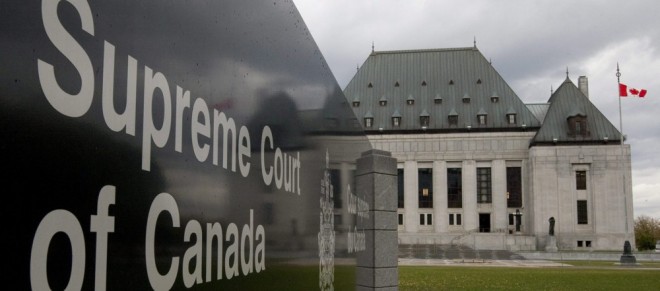Securities Reference: the power of one
There’s no good reason to believe a single regulator is better than two, or three, or ten
The Supreme Court of Canada is seen in Ottawa, Monday October 17, 2011. THE CANADIAN PRESS/Adrian Wyld
Share
 If you’ll pardon an off-the-cuff reaction to the Supreme Court’s securities-regulation finding: the federal government tried to argue that the right number of securities-regulating bodies for our country is, eternally and as a matter of Euclidean certainty, “one”. The counter-argument is that the optimum number might be higher than that: it might be one, or two, or three, or ten. Leaving aside the actual constitution, and going only from first principles, you could only support the federal reference if you believed no answer but “one” was ever, under any circumstances, appropriate for a country.
If you’ll pardon an off-the-cuff reaction to the Supreme Court’s securities-regulation finding: the federal government tried to argue that the right number of securities-regulating bodies for our country is, eternally and as a matter of Euclidean certainty, “one”. The counter-argument is that the optimum number might be higher than that: it might be one, or two, or three, or ten. Leaving aside the actual constitution, and going only from first principles, you could only support the federal reference if you believed no answer but “one” was ever, under any circumstances, appropriate for a country.
Ten systems seems unlikely to be a sensible choice, of course, but then, the SCC’s decision doesn’t obligate us to keep ten (or 13) systems running in parallel; it leaves the provinces free to devise cooperative arrangements between themselves if they perceive no benefit in the independent exercise of that constitutional power. It is not really difficult to imagine a collaborative process that leaves us with one regulator in the medium term (or maybe two, CPP/QPP-style), the moreso since the efficiency argument for one regulator is ostensibly strong. (Let us note that Alberta has had a change of government, a change that looks increasingly radical with each passing week, since this whole brawl started.)
What, then, has been lost by this decision? As I see it, a finding in favour of the federal government would have closed off one future path permanently, and ended the debate; the finding we got leaves any overall arrangement for securities regulation attainable. That seems like a positive feature.
Emmett Macfarlane says this in an awkward way in his piece for us, but it should be reiterated that no comparison or parallel with the Supreme Court’s evidence-driven finding in the Insite case is really appropriate. Insite involved a dilemma where there were good, solid, historically-founded constitutional arguments on both sides, and the Court hardly had any choice but to improvise. The securities reference was a matter of a federal government flinging a Hail Mary and trying to reverse generations of pretty-much-unanimous precedent.
The stated reason for attempting this is that financial intermediation has somehow changed in nature over recent decades, and is no longer reasonably subject to the “property and civil rights” heading in the BNA Act. I’m inclined to just say “Aw, foofaraw” to this. Excuse the inside baseball, but I’m reading Dumas Malone’s six-volume biography of Thomas Jefferson these days, and like any good work of history, it provides a very instructive reminder of how little has changed. The “advanced financial instruments” that Alexander Hamilton devised, and that Jefferson objected to as being inherently dubious, were crude by the standards of 2011. But those two were carrying on the same debate that is going on now, and a time-traveller from the past would need surprisingly little instruction to understand our tussles over the nature of finance.
The idea that mutual funds and hedge funds and derivatives and credit-default swaps are qualitatively new entities, demanding essential change to anybody’s constitutional structure—that just strikes me as a load of ahistorical balderdash. The Fathers of Confederation knew a thing or two about wily schemes for expanding credit beyond the limits of physical production in the economy; for many of them, such schemes were the consuming passion of their lives.
What I do notice, surveying the world scene, is that centralized regulation, which certainly is the norm in the rest of the world at the country scale, has not fared well in the current financial crisis. It’s amazing the federal government had time to demand such a change, given how busy they are the rest of the time in trumpeting Canada’s financial regulation as the globe’s finest, a rock of confidence in a sea of troubles. Is there really that much benefit in putting all the laziness and corruptibility in one place, that it may more readily be exploited by a Bernie Madoff? It’s practically a law of history that the regulators will always be one step behind the ambitious quants, loophole-wrigglers, and sheer fraudsters. (The converse is that in regimes where this is not true, where the Jeffersonian hatred of financial speculation prevails, much injury to credit, growth, and innovation will be done along with the good.)